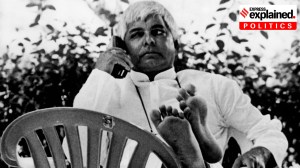No need to confirm Christian divorce — HC
September 19: In an order expected to be widely welcomed, the Bombay High Court has ruled that Indian Christian couples no longer need to ...

September 19: In an order expected to be widely welcomed, the Bombay High Court has ruled that Indian Christian couples no longer need to confirm their divorce once granted by the family courts set up for the purpose.
A division bench of Justice B N Srikrishna and Justice Ranjana Desai on August 25, while delivering this ruling, however clarified that this will not apply to approximately 200 pending cases, where the provisional decree nisi has been granted and is awaiting the HC’s confirmation. Directing them to the family courts would be cumbersome and mean that the process would have to start all over again. These will be disposed of in accordance with Section 16 of the Indian Divorce Act (IDA) by being placed before a single judge bench of the HC for being made absolute, the bench has ruled.
According to the Indian Divorce Act applicable to Christians, all divorces granted by the high court had to be confirmed by a single judge of the HC after six months. All decrees granted by district courts had to be confirmed by a three-judge HC bench. On May 5, 2000, a full bench of Justice N J Pandya, Justice Ranjana Desai and Justice V C Daga in the Romila Jaidev Shroff vs Jaidev Rajnikant Shroff ruled that all matrimonial matters pending before the HC shall be transferred to the Family Court for hearing and disposal in accordance with IDA provisions. Hence all the cases were transferred to the Family Court. The issue before the bench was that after the Family court grants a decree of divorce would it be necessary to come for confirmation before the three-judge HC bench which is deemed as the district court.
Some 15 petitions were referred by the chief justice to the bench where a decree nisi was awarded by a single HC judge and required confirmation. In all there are about 200 similar matters. However the bench clarified, “If the proceedings were pending at a stage prior to making the decree nisi, then there is no difficulty in holding that those proceedings shall stand transferred to the Family Court and be disposed of in accordance with the Act.”
For the past nine years, litigants, lawyers and even judges considered themselves bound by the Kanak Vinod Mehta vs Vinod Dulerai Mehta 1991 ruling which held that not withstanding the coming into force and establishment of the Family Courts, the HC could not cease to have jurisdiction. None of the proceedings under IDA pending before HC was legally held transferable during the interregnum from Kanak Mehta 1991 – Romila Shroff 2000. This law was followed until the division bench’s view came to be questioned before the full bench. The full bench’s ruling in Romila’s case drastically changed the situation under law.
The bench while concurring on the absolute jurisdiction of the family court to deal with further proceedings said that it was arriving at the judgement keeping in mind the criticism about the cumbersome procedure under Section 16,17 and 20 of IDA including recommendations to the Legislature to do away with the "incongruity of requirement of confirmation of decree" by bringing suitable amendment. “For one reason or the other, nothing has happened on the Legislative front… the view we propose to take…renders it unnecesary for the Legislature to act now.”
“We are of the view that from the date of Romila all pending matters where a decree nisi has not been made by this court are required to be transferred to the Family Court which alone shall exercise jurisdiction in those cases in accordance with the provisions of the Family Courts Act 1984. Once this occurs, it is clear that there is no further question of confirmation of the decree by the Family Court. The anathema of the Sections 16, 17 and 20 of the IDA is automatically removed.”



- 01
- 02
- 03
- 04
- 05



























